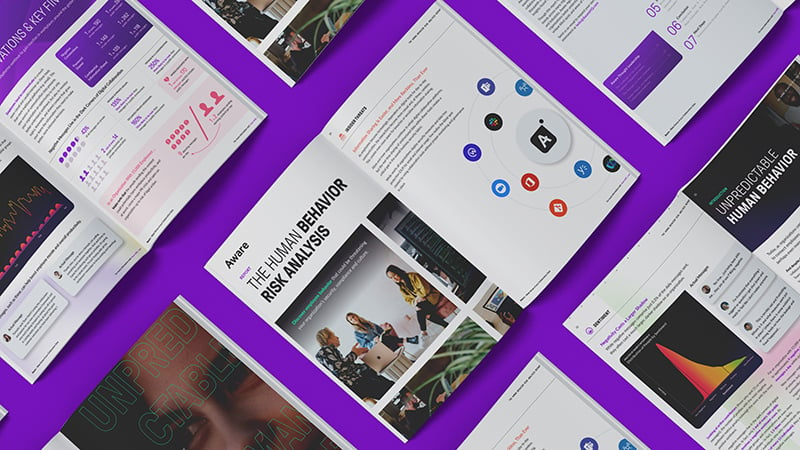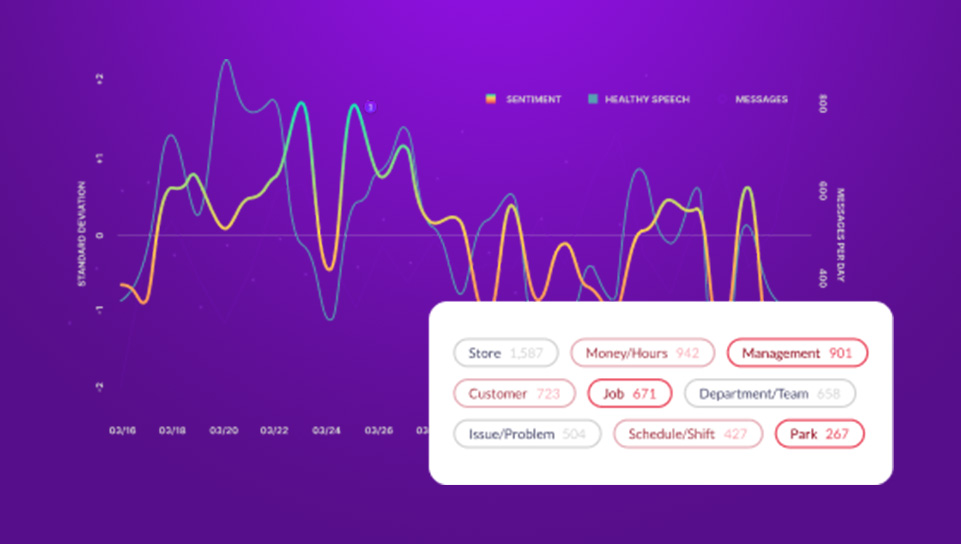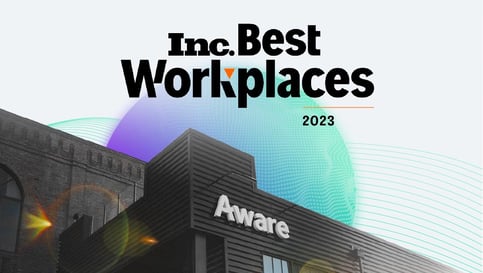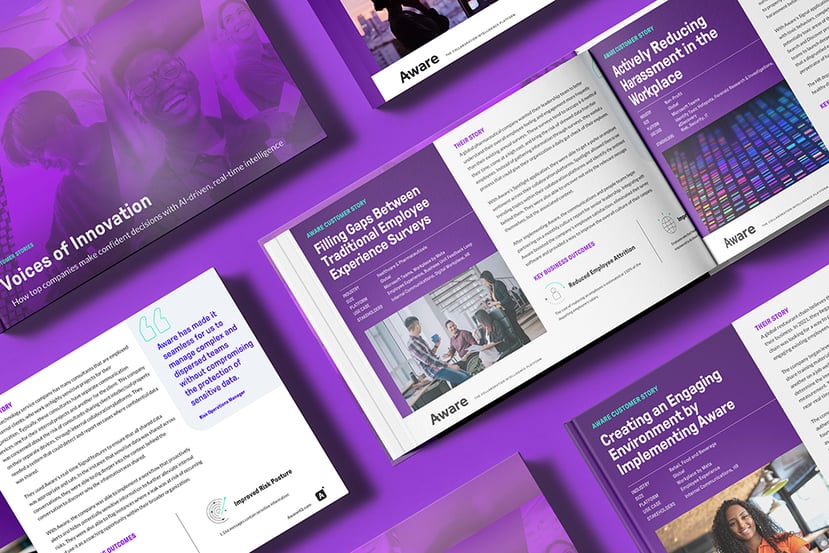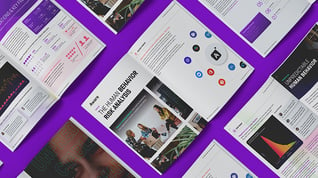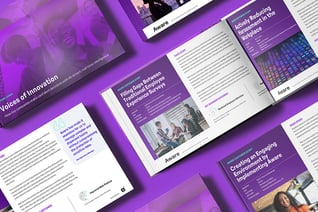The Complete Guide to Compliance Monitoring in Healthcare
by Aware
HIPAA compliance involves safeguarding patient records and protected health information (PHI) by healthcare organizations. HIPAA adherence allows healthcare providers to demonstrate their commitment to patients and their data, industry best practices, and better patient outcomes.
Contents
- What is healthcare compliance monitoring?
- What are the challenges faced in healthcare compliance?
- What are the best practices for strengthening healthcare compliance?
- How Aware helps companies address HIPAA compliance risks
What is HIPAA?
The Health Insurance Portability and Accountability Act (HIPAA) is a federal regulation that protects patient confidentiality. HIPAA covers patient’s rights over the information associated with their private health decisions and information. Non-compliance incidents can be fined between $100 and $50,000 per violation.
What is healthcare compliance monitoring?
Healthcare compliance monitoring is the process of evaluating and verifying adherence to all relevant regulations and laws concerning the healthcare industry. It can also refer to monitoring for compliance with internal policies for the organization.
Such monitoring is vital to ensuring patient data privacy and security as mandated by HIPAA. Noncompliance can result in hefty fines and lawsuits for the healthcare provider, as well as reputational damage.
Healthcare compliance guidelines also protect patient safety and quality of care. These policies are designed to deliver better clinical practices and care standards that lead to more positive patient outcomes. The result is a culture of integrity, nurturing, ethics, and accountability in the healthcare system’s workforce.
For HIPAA covered entities that participate in programs like Medicare and Medicaid, compliance monitoring protects against fraud, waste, and abuse.
A robust compliance monitoring program helps healthcare systems proactively identify noncompliance before it escalates, ultimately protecting patients and the organization’s reputation while avoiding costly penalties.

Learn more about how Aware supports real-time compliance across the enterprise
What are the challenges faced in healthcare compliance?
Many factors contribute to the challenges healthcare companies face when performing compliance monitoring. Managing access is one of the most critical. Ensuring proper controls are in place for users to access patient data without compromising sensitive information involves a multi-pronged approach. Doctors, nurses, researchers, contractors, and admin personnel must all access various types of PHI in whole or in part, and determining who gets what data is complex. Maintaining role-based access controls and monitoring compliance is essential to successfully protecting PHI and maintaining HIPAA compliance.
These controls must also apply to third-party contractors and vendors providing services to the healthcare provider. Integrations with new tools and technologies must similarly be managed to ensure that no compliance gaps are introduced that could put healthcare systems and data at risk.
As regulations evolve over time, it’s up to healthcare companies to keep up. Organizations must stay compliant with new or modified rules and guidelines as failure to adapt to regulatory updates may bring significant consequences, including fines, penalties, and reputational harm.
Deploying a real-time solution that actively audits and monitors a healthcare system’s IT infrastructure is important for detecting potential breaches or violations, as is enforcing robust auditing protocols across the organization’s collaboration programs and workforce. However, these measures can prove time-consuming, expensive, and difficult without the right tools.
Learn More: Is Microsoft Teams HIPAA Compliant?
Responding to compliance concerns may be challenging, but it’s necessary to be prompt with correction and education. The clearer the procedures and accountability measures are, the more readily addressed the offenses are in real time. Swift action saves liability and reputation and preserves patient and healthcare workforce trust.

Using collaboration tools like Slack in your healthcare workplace? Here's what you need to know
What are the best practices for strengthening healthcare compliance?
Taking compliance monitoring to the next level can give healthcare organizations everything they need to protect patient data, elevate regulatory adherence, reduce risk posture, and avoid costly penalties. The following steps are some best practices your organization can implement in a work plan to mitigate compliance risk:
- Conduct an internal audit—Assess the current state of compliance within your organization by reviewing policies, procedures, systems, and workforce practices. Address any gaps or areas of non-compliance swiftly.
- Identify top risks—Your compliance audit findings will have highlighted risk areas of potential concern. Prioritize any significant risks by their greatest threat to compliance and begin plans to fix them.
- Establish acceptable use policies—Develop and implement well-defined procedures and standards of conduct with your compliance committee to address the risks identified in your risk assessment and realign your policies with regulations like HIPAA.
- Provide ongoing training—Determine if new training programs need to be in place and continue any ongoing education initiatives that will keep the workforce up to date on new regulations and best practices as they evolve.
- Create compliance-focused KPIs—Develop key performance indicators that measure and monitor compliance, such as tracking violations, employee training completion rates, and the effectiveness of corrective actions.
- Establish correction processes—Address compliance infractions with clear processes when they occur. Promptly investigate the issue, correct the action with swift enforcement actions to mitigate risk, document all the steps taken, and establish employee training protocols to reduce future violations.
- Implement an ongoing compliance monitoring plan—Create continuous monitoring and auditing mechanisms to assess compliance across your organization’s ecosystem and workforce activities. This way, you can identify concerns before they escalate or become a full-fledged violation.
- Foster a culture of compliance— Promote an environment of ethics and compliance throughout the organization. Develop a code of conduct, compliance training, compliance policies, and a complete healthcare compliance manual for employees to follow. With this compliance program guidance, you can build an effective compliance program for the long term.
These proactive measures to strengthen your compliance posture can help your healthcare organization better protect patients, their data, and PHI, and help your workforce maintain regulatory compliance. Avoiding significant financial and reputational consequences is an added benefit.

Avoid these critical risks in your digital workplace with real-time compliance from Aware
How Aware helps companies address HIPAA compliance risks
With Aware, healthcare compliance officers can improve their compliance posture and follow best practices to ensure HIPAA compliance across their workforce, fostering a culture of trust and ethics. Aware’s AI platform was purpose-built to support compliance officers as they address the high risks healthcare workers are routinely exposed to.
The Aware platform helps streamline processes, and saves time and costs by easily automating real-time compliance monitoring for healthcare with near-human accuracy, returning fewer false positives than leading competitors. Reduce time with fast, federated searches during compliance investigations, and identify unauthorized information sharing before it becomes a major violation.
With Aware, healthcare organizations can implement granular security controls, create and monitor acceptable use policies, and create role-based access controls (RBAC) to maintain HIPAA compliance and surface non-compliance in real time.
Request a demo to learn how Aware can support your compliance monitoring initiatives and protect your healthcare workforce, patient care, and patient outcomes.
